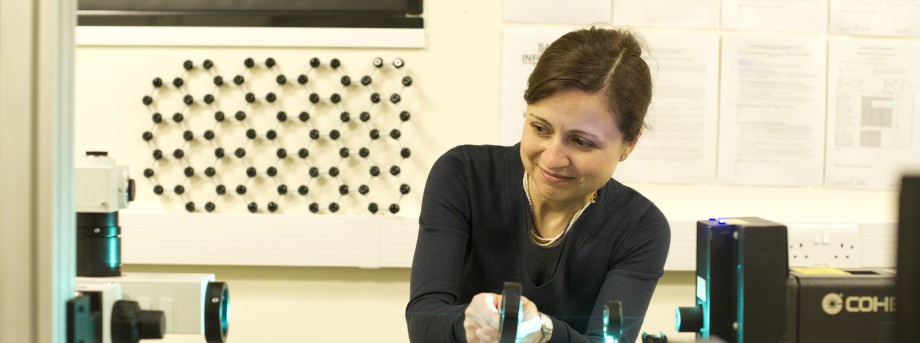The University of Nottingham
 Exchange online
Exchange online
Research Exchange
Major partnership for research into graphene — the ‘wonder material’

The University of Nottingham is joining one of the largest ever European research initiatives which aims to take the ‘wonder material’ graphene and related layered materials from academic laboratories to everyday use — turning cutting edge scientific research into marketable products.
The University is one of 66 new partners invited to join the Graphene Flagship which is doubling in size following the results of a €9 million competitive call. The partnership now includes more than 140 organisations from 23 countries and places Europe in the driving seat for the global race to develop graphene technologies.
Amalia Patane, Professor of Physics in the School of Physics and Astronomy, said: “We are delighted about this exciting partnership with the Graphene Flagship. From the scalable growth and fabrication of new systems to the demonstration of vertical tunnel transistors and LEDs, our project will contribute to create new routes to device miniaturization, fast-electronics, sensing and photonics. There is great potential for further growth of all these sectors as the fabrication of two dimensional systems improves and as new properties are discovered and implemented in functional devices.”
The incoming 66 partners will add new capabilities to the scientific and technological scope of the flagship.
Nottingham will develop graphene-hybrid devices based on a novel class of exfoliable compounds that expands and enriches the current ‘library’ of two dimensional crystals by overcoming limitations of currently available layers and by offering a versatile range of electronic properties. Expertise in semiconductor physics and devices coupled with the availability of state-of-the-art facilities for fabrication and advanced physical studies will complement several scientific and technological work packages of the Graphene Flagship on materials, fundamental science, high frequency electronics and optoelectronics.
Neelie Kroes, Vice-President of the European Commission, welcomed the news. She said: “Europe is leading the graphene revolution. This wonder material has the potential dramatically to improve our lives: it stimulates new medical technologies, such as artificial retinas, and more sustainable transport with light and ultra-efficient batteries. The more we can unlock the potential of graphene, the better.”
The €9 million competitive call of the €54 million ramp-up phase attracted a total of 218 proposals, representing 738 organisations from 37 countries. The proposals received were evaluated on the basis of their scientific and technological expertise, implementation and impact and ranked by an international panel of leading experts, mostly eminent professors from all over the world.
Jari Kinaret, Professor of Physics at the Chalmers University of Technology, Sweden, and Director of the Graphene Flagship, said: “The response was overwhelming, which is an indicator of the recognition for and trust in the flagship effort throughout Europe. Competition has been extremely tough. I am impressed by the high quality of the proposals we received and looking forward to working with all the new partners to realise the goals of the Graphene Flagship.”
Graphene was made and tested in Europe, leading to the 2010 Nobel Prize in Physics for Andre Geim and Konstantin Novoselov from the University of Manchester.
Professor Andrea Ferrari, Director of the Cambridge Graphene Centre and Chair of the Executive Board of the Graphene Flagship commented today’s announcement on new partners: “This adds strength to our unprecedented effort to take graphene and related materials from the lab to the factory floor, so that the world-leading position of Europe in graphene science can be translated into technology, creating a new graphene-based industry, with benefits for Europe in terms of job creation and competitiveness.”
The Graphene Flagship represents a European investment of €1 billion over the next 10 years. It is part of the Future and Emerging Technologies (FET) Flagships announced by the European Commission in January 2013.
The goal of the FET Flagships programme is to encourage visionary research with the potential to deliver breakthroughs and major benefits for European society and industry.
Tags: Cambridge Graphene Centre, Chalmers University of Technology, Future and Emerging Technologies, graphene, Graphene Flagship, optoelectronics, School of Physics and Astronomy
Leave a Reply
Other News

Top prize for quantum physicist
A University of Nottingham physicist has won a prestigious medal from the Institute of Physics for […]

Zero carbon HOUSE designed and built by students comes home
Design and construct a low cost, zero carbon, family starter home, transport it to Spain, build […]